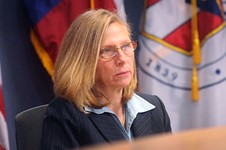Point Austin: Burning Down the House
Deadlock between city and firefighters reflects deeper problems
By Michael King, Fri., Sept. 27, 2013
The very long-running city controversy – dating back at least to a 1977-1982 Department of Justice consent decree – over how to assemble a structurally effective yet demographically diverse Austin Fire Department – shows few signs of resolution. In the latest developments, after four months of negotiations with the Austin Firefighters Association, the city ended meet-and-confer contract negotiations in August – both sides cited disagreement over the hiring process as the primary point of contention. Then, on Sept. 16 – two weeks before the current contract expires, reverting the AFD to civil service rules on Oct. 1 – the U.S. Equal Employment Opportunity Commission issued a ruling that the city's 2012 hiring process was effectively discriminatory against both African-American and Hispanic applicants.
Accordingly, the city stopped any more hiring from the 2012 list of candidates (which had produced exactly one successful black applicant). The 2013 process and list remain under EEOC review; it's not yet clear how much that process differed from the previous year's. According to a letter issued by its San Antonio field office, the EEOC "attempts to eliminate the alleged unlawful practices by informal methods of conciliation [and] invites the parties to join with it in reaching a just resolution of this matter."
Unfortunately, the relevant parties – city management, the union, and minority applicants – aren't exactly on cordial terms at the moment, nor indeed even talking to one another. AFA President Bob Nicks told me the union wants to return to the negotiating table, but that the city is unwilling, a sentiment confirmed for me by labor relations officer Deven Desai, who said negotiations had already lasted twice the time required by law.
And the war of words continues. "You might think I'm crazy," said Nicks, "but I believe the city colluded with the EEOC in the timing of this ruling, because it allows them to do what they always wanted to do – to take sole control of the hiring process." Responded Desai: "There's been no collusion. ... The EEOC and the Department of Justice have their own timelines, and the city has nothing to do with that."
Big Boss Men
Nicks says the union has had a good working relationship with Chief Rhoda Mae Kerr, and blames upper management – most specifically Deputy City Manager Mike McDonald – for sabotaging negotiations in order to undermine the union. McDonald's unavailable this week, but has repeatedly argued that the union's intransigence has blocked substantive attempts to diversify the workforce, and has become an illegitimate imposition on management prerogatives in hiring. Lately, he's been joined by the editors at the Statesman, fulminating sternly against the radical notion that working firefighters should have any role in the hiring process at all.
Desai, while not so obstreperous as the daily, reiterated management's position that all the city sought in negotiations "was exactly what we have [in the hiring process] with the police, and the same thing we negotiated for with EMS," which is indeed management's direct control of hiring. "The city is committed to safety in all three areas," Desai said, "in hiring, in training, and the safety of our employees." (He added that the union's opposition to a zero-tolerance drug-testing policy also made agreement impossible.) He said he doesn't understand why a hiring process acceptable to police officers and EMS staff is somehow unacceptable to firefighters.
Good Intentions Insufficient
What happens next isn't entirely clear. Presumably the EEOC and the parties will engage in some kind of conciliation process, but after Tuesday, the union will be operating without a contract under civil service law. The city hasn't released the results of the 2013 hiring process (still being reviewed by the Commission), and Nicks speculates that's because the revised process worked – but management prefers an impasse that strengthens its hand.
It didn't help matters that the EEOC's ruling was apparently inaccurate – according to a memo to AFD staff from Chief Kerr, the agency miscalculated both the number of 2012 black applicants and the specific number taking the "cognitive test" it judged discriminatory. It helped even less that (as the city has since acknowledged) the test administration was bungled (shortening the test time), and had an arbitrary, unjustified "cut score" of 70%. Both elements are known to have "adverse impact" on minority candidates.
City management has repeatedly insisted that its intention is not to undermine the union, but to follow the law while moving AFD to more effectively represent the demographics of the city it serves. In his turn, Nicks has insisted to his members and the public, "Our association simply wants what we believe our community wants: A hiring process that is job-related and fair for all applicants regardless of ethnicity or gender." That now may well be true – after many years under Nicks' predecessors when it visibly was not, reflecting a dismal pattern in fire departments nationwide. The department has a great deal of lost ground to make up, and as the "consent-decree generation" enters its retirement years, the situation will certainly get worse before it gets better.
Rhetorically at least, all parties claim to want the same thing: a qualified, diverse (which is to say just), effective fire department which does its job well and maintains the trust and solidarity of the whole community. But unless trust can first be rebuilt between firefighters and the city administration that manages them, it will be extremely difficult to achieve those larger goals.
Got something to say on the subject? Send a letter to the editor.











